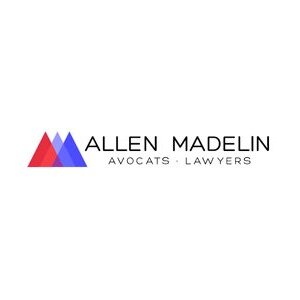Best ESG Advisory & Compliance Lawyers in Montreal
Share your needs with us, get contacted by law firms.
Free. Takes 2 min.
List of the best lawyers in Montreal, Canada
About ESG Advisory & Compliance Law in Montreal, Canada
Environmental, Social, and Governance (ESG) advisory and compliance have become key components of corporate governance and legal planning in Montreal, Canada. ESG refers to a set of standards for how companies manage their environmental impact, interactions with employees and communities, and the structure and oversight of their leadership. ESG advisory and compliance law offers legal guidance on how businesses can meet increasing regulatory, investor, and public expectations while minimizing risks and maximizing long-term sustainability and reputation. In Montreal, ESG is a growing area of interest for public and private sector organizations seeking to compete both locally and internationally.
Why You May Need a Lawyer
Navigating the ever-evolving landscape of ESG regulations can be challenging. There are several scenarios in which seeking legal advice from an ESG advisory and compliance lawyer in Montreal is important, such as:
- Ensuring your business complies with federal, provincial, and local environmental laws and reporting requirements
- Drafting and implementing company policies that address climate change, diversity and inclusion, data privacy, and ethical governance
- Managing risks associated with non-compliance, including potential fines, sanctions, or litigation
- Preparing for ESG-related disclosures required by regulators or the Toronto Stock Exchange for listed companies
- Integration of ESG considerations into mergers, acquisitions, or other significant business transactions
- Responding to stakeholder inquiries or activism related to ESG matters
Legal professionals specialized in ESG provide strategic advice, draft necessary documentation, and can represent your interests in proceedings related to claims of non-compliance or disputes connected to ESG issues.
Local Laws Overview
Montreal businesses are subject to a combination of federal, provincial (Quebec), and municipal laws that influence ESG practices. Some key areas include:
- Environmental Regulations: The Canadian Environmental Protection Act (CEPA), Quebec’s Environment Quality Act, and related municipal laws set out standards for pollution prevention, waste management, and reporting obligations.
- Human Rights and Labour Laws: Quebec’s Charter of Human Rights and Freedoms, the Labour Standards Act, and federal employment laws address workplace equality, anti-discrimination, and fair labour practices.
- Corporate Governance: Companies registered in Montreal must comply with the Business Corporations Act (Quebec) and may also be subject to federal rules regarding board structure, transparency, and anti-corruption.
- Climate-Related Financial Disclosure: There is a growing expectation for companies to disclose climate-related financial risks, especially those listed on Canadian exchanges, following guidelines from bodies like the Canadian Securities Administrators (CSA).
- Privacy and Data Security: Quebec’s new privacy law, Law 25, and the Personal Information Protection and Electronic Documents Act (PIPEDA) set out strict standards for the protection of employee and customer information, which is a significant part of the S and G in ESG.
Compliance with these laws is mandatory for many businesses and can form the basis for stakeholder trust and business success.
Frequently Asked Questions
What is ESG and why does it matter for businesses in Montreal?
ESG stands for Environmental, Social, and Governance. It refers to a set of standards that guide companies on how to operate responsibly and sustainably. For businesses in Montreal, integrating ESG is increasingly important to meet legal requirements, gain investor confidence, and appeal to a socially conscious marketplace.
Are there specific ESG reporting requirements in Quebec?
Yes. Publicly listed companies are often required to report on certain ESG metrics, especially related to environmental performance and climate risks. Quebec is also moving towards more robust disclosure standards, in line with national and international best practices.
How can a lawyer assist with ESG compliance?
A lawyer can help ensure all company policies, procedures, and reporting meet applicable legal standards. They can also provide advice on risk management, draft and review documents, and help resolve any complaints or regulatory investigations.
What are the consequences of ESG non-compliance?
Consequences can include regulatory fines and penalties, lawsuits, reputational damage, and loss of investor or customer trust. Non-compliance with environmental and privacy regulations can also result in criminal or administrative sanctions.
Can small businesses benefit from ESG advisory services?
Absolutely. Small and medium-sized businesses can face unique ESG risks and opportunities. Proactive ESG strategies can improve long-term performance, access to financing, and relationships with clients and partners.
Is ESG compliance mandatory for all companies in Montreal?
Some ESG components, such as environmental and privacy compliance, are mandatory for most businesses. Other ESG activities, like detailed sustainability reporting, may be required for listed or regulated entities but are increasingly being encouraged for all companies.
How do local laws affect ESG policies?
Local Quebec and Montreal regulations establish specific requirements for environmental practices, workplace standards, privacy, and corporate governance. These laws form the foundation of any effective ESG program in the province.
How should companies handle ESG risks related to data privacy?
Companies should implement robust data management and privacy policies in line with Quebec’s Law 25 and federal privacy laws. Regular audits, staff training, and incident response planning are key parts of compliance.
What role do stakeholders play in ESG compliance?
Stakeholders such as investors, employees, customers, and community groups push for greater transparency and ethical practices. Their expectations can drive companies to adopt stronger ESG policies and disclosures, above and beyond legal obligations.
How can non-profit organizations engage with ESG advisory and compliance?
Non-profits in Montreal also face ESG considerations, from demonstrating environmental stewardship to ensuring diversity, equity, and inclusion. Legal counsel can help these organizations implement effective policies and report to funders or government agencies.
Additional Resources
Anyone seeking more information on ESG advisory and compliance in Montreal may find support and guidance from the following organizations:
- Government of Quebec - Ministry of the Environment, the Fight Against Climate Change, Wildlife and Parks
- Autorité des marchés financiers (AMF) for securities and financial market regulation
- Canadian Securities Administrators (CSA) for climate disclosure guidelines
- Canadian Bar Association - ESG resources
- Sustainable Montreal and other municipal sustainability organizations
- Chambre de commerce du Montréal métropolitain (Montreal Chamber of Commerce) for business ESG events and programs
Next Steps
If you or your organization needs legal assistance with ESG advisory and compliance in Montreal, consider the following steps:
- Conduct an internal review of your current policies, practices, and areas that may require improvement
- Identify your key ESG risks and obligations under local and national law
- Consult with a qualified lawyer specializing in ESG, corporate, or environmental law
- Prepare necessary documentation for compliance and disclosure
- Implement staff training and regular compliance audits
- Stay informed about changes to ESG-related regulations and best practices
A legal professional can help you confidently navigate the complex ESG requirements and position your business or organization for long-term success in Montreal’s evolving regulatory environment.
Lawzana helps you find the best lawyers and law firms in Montreal through a curated and pre-screened list of qualified legal professionals. Our platform offers rankings and detailed profiles of attorneys and law firms, allowing you to compare based on practice areas, including ESG Advisory & Compliance, experience, and client feedback.
Each profile includes a description of the firm's areas of practice, client reviews, team members and partners, year of establishment, spoken languages, office locations, contact information, social media presence, and any published articles or resources. Most firms on our platform speak English and are experienced in both local and international legal matters.
Get a quote from top-rated law firms in Montreal, Canada — quickly, securely, and without unnecessary hassle.
Disclaimer:
The information provided on this page is for general informational purposes only and does not constitute legal advice. While we strive to ensure the accuracy and relevance of the content, legal information may change over time, and interpretations of the law can vary. You should always consult with a qualified legal professional for advice specific to your situation.
We disclaim all liability for actions taken or not taken based on the content of this page. If you believe any information is incorrect or outdated, please contact us, and we will review and update it where appropriate.











